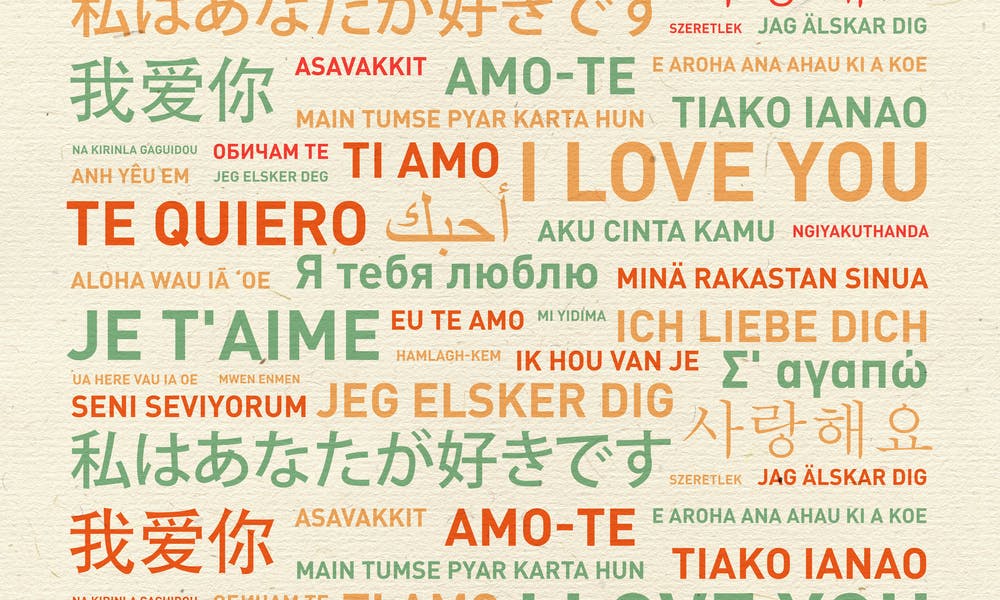How to Say “I Love You” in 50 Different Languages of the World

Ah, Valentine’s Day, the day of love, where bountiful bouquets, romantic dinners, and perfectly ornate gift boxes abound, all as a way for lovers to express their feelings for one another. With its origins buried in Rome, the very first time this day was celebrated dates back to the year 496! In addition to the celebration of love, Valentine’s Day has important cultural and religious implications for many people worldwide and as such, it is widely recognized and celebrated internationally. In honor of the day of love that is fast approaching, we are going to:
- Discuss romantic and quirky Valentine’s Day traditions around the globe
- Show you how to say “I love you” in 50 of the most commonly spoken languages, categorically.
- Discuss the use of “I love you” in different cultures.
We hope that by the end of this article, you are well-equipped to impress your sweetheart with some fun new facts and language skills over a candle-lit dinner.
Valentine’s Day Traditions from Around the World
Apart from conventional candle-lit dinners and chocolate, have you ever wondered how cultures outside of North America commemorate this love-filled holiday? In Japan, the roles are reversed, and women are expected to purchase chocolates and other gifts for the men in their lives, including family members, coworkers and bosses alike! Exactly one month later, the men are expected to return the favor.
In Finland on the other hand, Valentine’s Day is a day to honor friendships rather than romantic relationships and in Wales, couples exchange daintily carved wooden spoons, appropriately named lovespoons, as a token of their affection. In Germany, pigs rule the day, as they are known to symbolize lust and luck, and couples exchange pig-themed chocolates, statues, and photographs! Last but not least, and our absolute favorite tradition, comes from Ghana where Valentine’s Day is known as National Chocolate Day, and chocolate-themed menus and events are in abundance.
How to Say “I Love You” in 50 Different Languages
Despite the varied cultural meanings and traditions surrounding Valentine’s Day, one thing remains the same, and that is the expression of love through three little incredibly emotive words. As the day of love approaches, have you ever wondered how to say “I love you” in a different language, either to express your love to your sweetheart or out of sheer curiosity? Given that there are over 6000 spoken languages in the world, the options are almost endless. If you don’t consider learning languages to be your forte but you would like to express how your significant other makes you feel in a new language this Valentine’s Day, then you are in luck! How to say “I love you” is one of the first things people often learn when learning a new language, and this little meaningful phrase is not easily forgotten.
“I love you” in the Romance Languages:
- French: “Je t’aime”
- Spanish: “Te amo” (used among spouses and serious couples) or “Te quiero” (used among friends and family members)
- Italian: “Ti Amo”
- Romanian: “Te iubesc”
- Portuguese: “eu te amo”
“I love you” in the Germanic Languages:
- German: “Ich liebe dich“
- Afrikaans:“Ek is lief vir jou”
- Dutch:“Ik hou van je”
- Yiddish: “Ikh hob dikh”
- Danish: “Jeg elsker dig”
- Swedish: “Jag alskar dig”
- Norweigan: “Jeg elsker deg”
- Icelandic: “ég elska þig”
“I love you” in the Slavic Languages:
- Russian: “Ya tebya lyublyu”
- Ukrainian: “Ta tebe kahayu”
- Polish: “Kocham cie”
- Czech: “Miluji te”
- Slovak: “Ľúbim ťa“
- Slovenian: “Ljubim te“
- Bosnian/Croatian/Serbian: “Volim te”
- Macedonian: Те сакам (Te sakam)
- Bulgarian: “Ubicham te”
“I love you” in the Altaic Languages:
- Japanese: “Aishiteru”
- Korean: “Sarang hapnida”
- Turkish: “Seni seviyorum”
“I love you” in the Austronesian Languages:
- Tagalog:“Mahal kita”
- Hawaiian: “Aloha au ia ‘oe”
- Malay: “Saya sayang awak”
- Tahitian: “Ua here vau la ie”
- Fijian: “Au domoni iko” (used romantically), “au lomani iko” (used among family, friends)
“I love you” in the Semitic Languages:
- Arabic: “Ana behibek” (female) or “Ana behibak” (male)
- Hebrew: “Ani ohev otkha”
- Maltese: Inhobbok
“I love you” in the Indo-Aryan Languages:
- Hindi: “Main tumse pyar kartha hoon”
- Bangla: “Āmi tōmāẏa bhālōbāsi”
- Nepali: “Ma timīlā’ī māyā garchu”
“I love you” in the Baltic Languages:
- Lithuanian: “Aš tave myliu”
- Latvian: “Es tevi milu”
“I love you” in other Commonly Spoken Languages:
- Greek- “S’agapo”
- Vietnamese: “Toi yeu ban”
- Mandarin: “Wo ai ni”
- Swahili: “Ninakupenda”
- Cambodian: “Soro lahn nhee ah”
- Irish Gaelic: “Taim i’ngra leat”
- Scottish (Gaelic): Tha gaol agam ort
- Taiwanese: “Gwa ai lee”
- Navajo: “Ayor anosh’ni”
- Inuit: “Nagligivagit”
- Thai: “Phom rak khun”
- Persian: “Duset daram”
The Use of I Love You Across Cultures:
And there you have it, how to say “I love you” in 50 different spoken languages of the world. Keep in mind that while this term of endearment exists across most, if not all, languages, its use does tend to vary culturally. In Western countries such as Canada and the United States, “I love you” is used quite liberally. For many people, it is something they habitually say to express their feelings of affection towards loved ones. In certain other cultures, however, this is not the case. In Japanese, Chinese and Indian cultures, for example, these three-letter words are used sparingly. In fact, rather than the explicit proclamation of love, these cultures tend to express their love implicitly through acts of kindness and thoughtful gestures, such as preparing a warm meal.
Whether you are more conservative like the Japanese or tend to be bold with your proclamations of love like the French (they actually use these three little words the most often), you are well prepared to be the most romantic version of yourself this Valentine’s Day!

